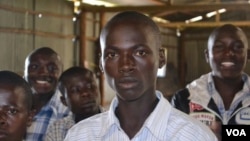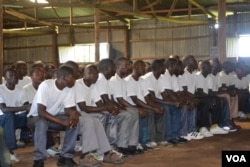KIGALI —
Over the past 16 years, Rwanda has demobilized some 3,000 child soldiers. Yet as these efforts continue, the United Nations claims that Kigali has been helping a Congolese rebel group, the M23, recruit children in Rwanda to send to fight in the neighboring Democratic Republic of Congo.
When Nizeyimani was a toddler, his parents left post-genocide Rwanda for the neighboring Democratic Republic of Congo. They died there when he was four years old. When he was 12, he was abducted in the refugee camp where he lived by soldiers from the Rwandan Hutu group, the FDLR, and taken to live in the bush with the rebels. He says life was very difficult, and those who tried to escape were caught and killed.
A relative eventually helped him to make his way to the U.N. peacekeeping mission, MONUSCO, which works with the government of Rwanda to help disarm its nationals who are combatants in the eastern DRC.
Former FDLR fighters are first sent to the Mutobo demobilization camp where ex-fighters -- both men and boys -- stay for three months. This is where Nizeyimani began the process of reintegrating into Rwandan society. Former child soldiers are then sent to a rehabilitation center, where they receive counseling and medical screening and resume basic school studies while efforts are made to find their relatives.
Yet while Rwanda is working to help its own children come home, the head of MONUSCO's child protection section in Kinshasa, Dee Brillenburg Wurth, claims it is deliberately and systematically recruiting others to fight for the M23. Some of the children that have been recruited are as young as 11 years old. While MONUSCO cannot work outside of Congo, Brillenburg Wurth said they have anecdotal evidence that Rwanda is actively recruiting children.
“We know from children -- and this corroborated by other children and by adults -- that children are being recruited for example, we had an example of a football coach, of a police officer. At the beginning they told us they had this system in place, like a pyramid scheme; $5 for every child that was recruited,” explained Brillenburg Wurth.
She says that out of 122 children interviewed, 37 were Rwandan. Some were recruited in their country, others in Congo. Some thought they were being recruited by the Rwandan army, while others did not even know they were in the DRC.
“Many of them were abducted… this is very, very common with any armed group... You go and loot or you need to carry your arms from A to B, you just take kids from the villages and they don't let them go back. Most of the children, in fact nearly all of them, started their life as a M23 child carrying stuff from the Rwandan border,” continued Brillenburg Wurth
Rwandan Foreign Minister Louise Mushikiwabo vehemently denied that Rwanda recruits children.
“Our track record in terms of military is very clear: Rwanda does not tolerate children being enrolled in any way near armed groups, not in our own army,” stated Mushikiwabo.
She said that once the crisis in the eastern Congo is resolved and armed groups are eliminated, the recruitment of child soldiers will end as well.
The United States has exerted its own pressure on Rwanda, recently blocking military aid to Kigali over its recruitment of child soldiers.
When Nizeyimani was a toddler, his parents left post-genocide Rwanda for the neighboring Democratic Republic of Congo. They died there when he was four years old. When he was 12, he was abducted in the refugee camp where he lived by soldiers from the Rwandan Hutu group, the FDLR, and taken to live in the bush with the rebels. He says life was very difficult, and those who tried to escape were caught and killed.
A relative eventually helped him to make his way to the U.N. peacekeeping mission, MONUSCO, which works with the government of Rwanda to help disarm its nationals who are combatants in the eastern DRC.
Former FDLR fighters are first sent to the Mutobo demobilization camp where ex-fighters -- both men and boys -- stay for three months. This is where Nizeyimani began the process of reintegrating into Rwandan society. Former child soldiers are then sent to a rehabilitation center, where they receive counseling and medical screening and resume basic school studies while efforts are made to find their relatives.
Yet while Rwanda is working to help its own children come home, the head of MONUSCO's child protection section in Kinshasa, Dee Brillenburg Wurth, claims it is deliberately and systematically recruiting others to fight for the M23. Some of the children that have been recruited are as young as 11 years old. While MONUSCO cannot work outside of Congo, Brillenburg Wurth said they have anecdotal evidence that Rwanda is actively recruiting children.
“We know from children -- and this corroborated by other children and by adults -- that children are being recruited for example, we had an example of a football coach, of a police officer. At the beginning they told us they had this system in place, like a pyramid scheme; $5 for every child that was recruited,” explained Brillenburg Wurth.
She says that out of 122 children interviewed, 37 were Rwandan. Some were recruited in their country, others in Congo. Some thought they were being recruited by the Rwandan army, while others did not even know they were in the DRC.
“Many of them were abducted… this is very, very common with any armed group... You go and loot or you need to carry your arms from A to B, you just take kids from the villages and they don't let them go back. Most of the children, in fact nearly all of them, started their life as a M23 child carrying stuff from the Rwandan border,” continued Brillenburg Wurth
Rwandan Foreign Minister Louise Mushikiwabo vehemently denied that Rwanda recruits children.
“Our track record in terms of military is very clear: Rwanda does not tolerate children being enrolled in any way near armed groups, not in our own army,” stated Mushikiwabo.
She said that once the crisis in the eastern Congo is resolved and armed groups are eliminated, the recruitment of child soldiers will end as well.
The United States has exerted its own pressure on Rwanda, recently blocking military aid to Kigali over its recruitment of child soldiers.





